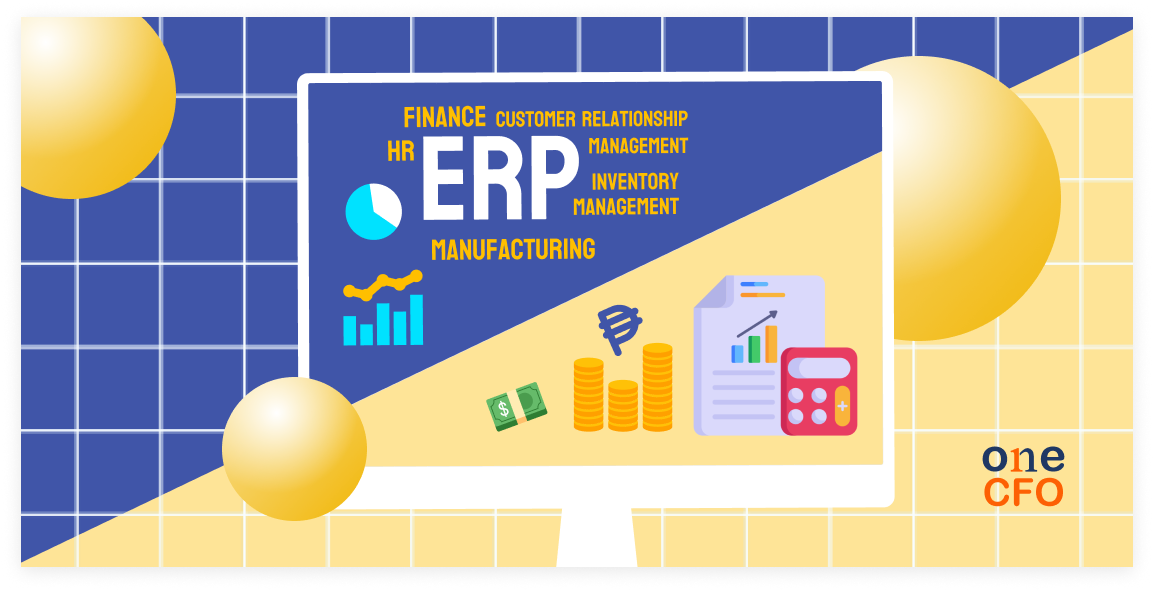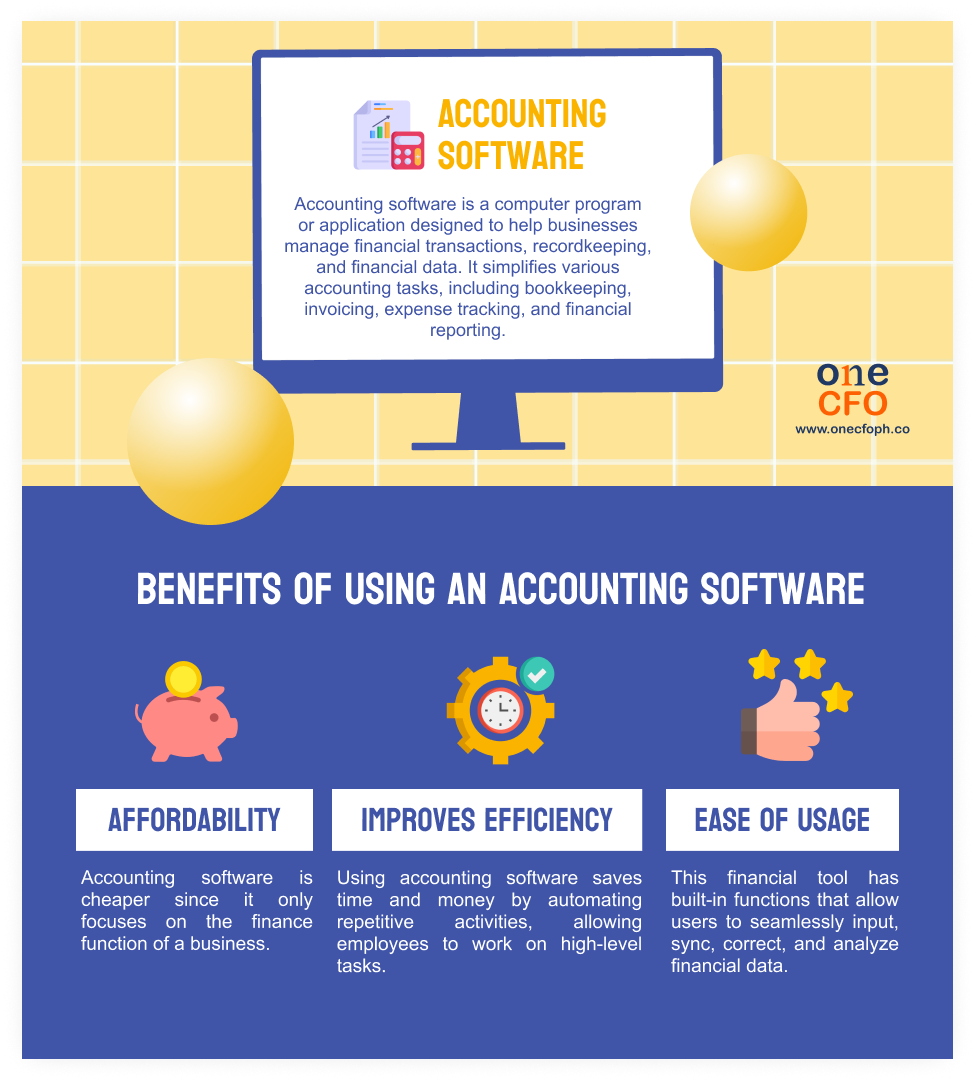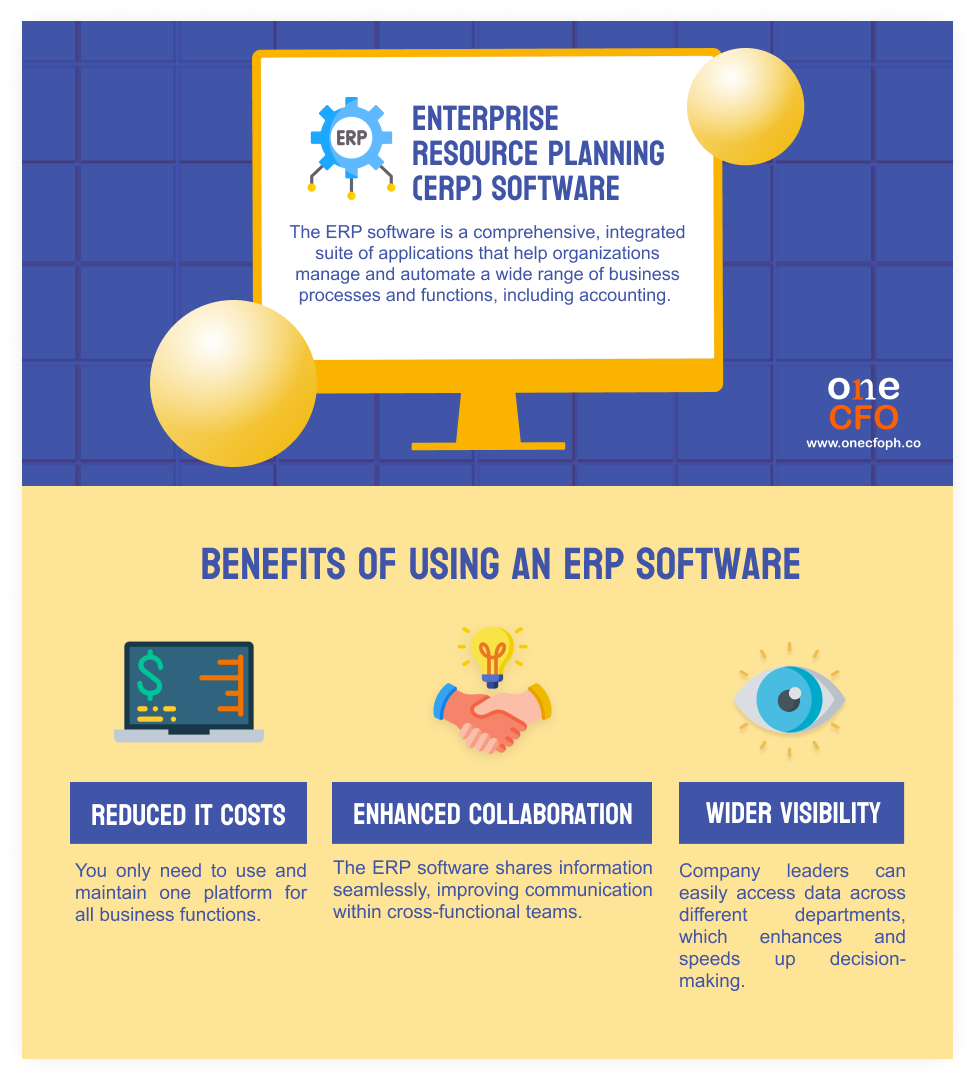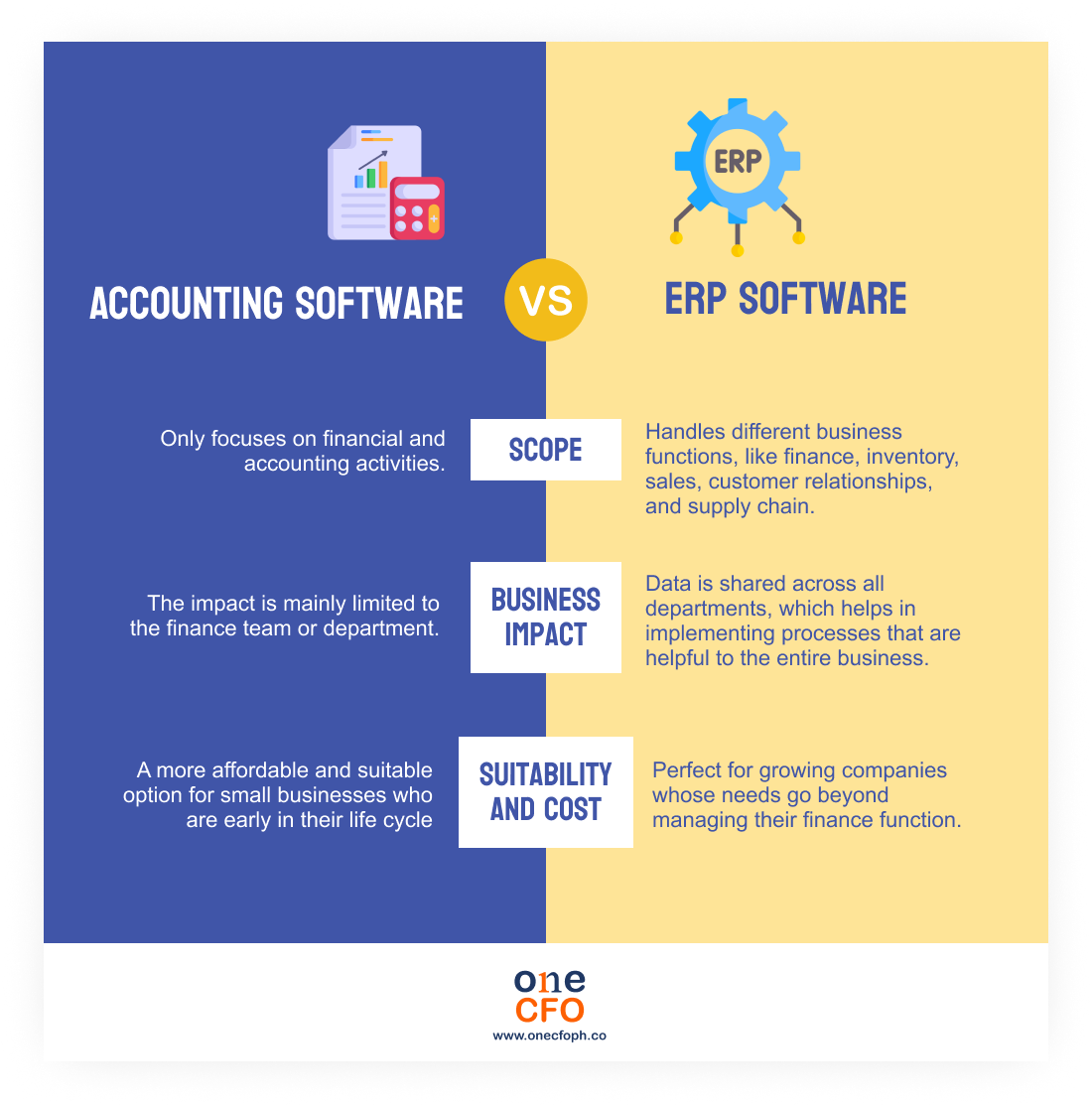
September 14, 2023 | 4:40 pm
Moving from manual recording of business transactions to automation as your small business
grows is essential to achieve efficiency. But is it time to get accounting software or use a
more comprehensive tool like ERP software?
While both software have some standard features, they are still different programs. These
differences determine whether a small business should use accounting software or ERP.
Accounting software, as described by its name, is mainly used for a business's accounting
and financial management purposes. This software solution covers basic financial tasks,
including managing account payables and receivables, generating financial reports, and more.
Meanwhile, enterprise resource planning or ERP software covers not only accounting functions
but also a whole lot of other business essentials. ERP software is a fully integrated system
handling supply chain management, human resource planning, warehouse management, customer
relationship management, and other critical business areas.
Understanding the differences between accounting software and ERP is helpful for small
business owners who need help deciding what to use or what fits their needs better. This
article will explain accounting software and ERP, their differences, benefits, and when you
should use each solution.
What is accounting software?
Accounting software is a computer program mainly
covering a company’s financial and
accounting activities. Businesses and individuals use this software to automate and
efficiently perform bookkeeping tasks, managing accounts
payables and receivables, sales
recording, expense tracking, cash flow management, and more.
Aside from the essential accounting functions, small business accounting software like Xero
offers more advanced features such as automatic recording of bank transactions, project
trackers that monitor costs and profitability, online file storage, and various app
integrations are available.
Moreover, small business owners use accounting software to generate financial reports like
income statements, balance sheets, and cash flow statements. With all the financial data
already entered into the system, the accounting software can quickly assemble these
statements for you.
Accounting software helps businesses increase work efficiency and reduce costs by automating
tasks that business owners used to do manually. Additionally, accounting programs give
entrepreneurs insights into their finances, improving and speeding up decision-making.
Companies mainly use accounting software to handle their financial activities while using
other programs for other business functions. However, as the business grows, using different
software for each business area may become unsustainable, especially when dealing with
multiple daily transactions.
What are the benefits of accounting software?

One of the main benefits of using accounting software is it’s the cheaper option. Since
accounting software only focuses on the financial aspect of a business, it’s less costly
than having software that can handle multiple business functions. Its affordability also
makes it attractive to small businesses that don’t have a lot of resources yet to invest in
software applications.
Using accounting software also improves the business’s efficiency and productivity.
Accounting software saves companies time by automating bookkeeping and other finance
activities that would otherwise done using electronic spreadsheets or manually. Automation
also allows business owners and employees to focus their energy on tasks that impact revenue
and business growth more.
Accounting software makes handling financial data easier. The software’s capabilities allow
business owners to connect and sync data across different platforms. There are also built-in
functions available that help detect and correct errors within the platform. Analyzing
financial data and creating reports also become more instant with accounting software.
What is ERP software?
Enterprise resource planning software, or ERP, is a suite of integrated software
applications covering almost every business area, including accounting. In short, ERP
software is like accounting software plus more!
Businesses use ERP software as a comprehensive and end-to-end solution since it serves most,
if not all, business functions in a single platform. ERP software also offers seamless
integrations across all business areas since they store the data in one place.
Some of the modules included in an ERP are functions for project management, human
resources, supply chain and operations, warehouse management, marketing, customer
relationship management, and other industry-specific solutions.
Because of its wide range of capabilities, there is a common misconception that ERP can be
very expensive; hence, only large businesses can use it. However, ERPs can also be
affordable and SME-friendly, like Britana.
Using ERP instead of basic accounting software gives businesses a unified view of their
enterprise data, allowing them to make relevant analyses and decisions for multiple
departments. Having access to data across all business functions also makes planning and
reporting more accurate and increases transparency within the company.
What are the benefits of ERP software?

ERP software dramatically reduces IT costs since using and maintaining different programs
for every business function is unnecessary. Additionally, using a single platform for all
departments lessens the time required to train your employees to use the software.
Collaboration between teams also improves when using ERP software. This software
automatically shares data and information across departments, reducing back-and-forth
communication between employees. ERP software also helps cross-functional teams track the
progress of each team member, increasing efficiency.
There is also more comprehensive visibility into company data when a business uses ERP
software, a centralized platform for all business information. ERP software also allows
company leaders to make and implement data-driven decisions and policies using real-time
data they can access from the software.
Accounting software vs. ERP software: What is the difference?
Even though accounting software and ERP software have overlapping features, they are still different in many ways. Here are some of the key differences between accounting software and ERP:

Scope
One of the most significant differences between accounting and ERP software is their
scope. Accounting software handles financial and accounting transactions, which helps create
finance strategies, monitor key performance indicators, and
manage risk. Small businesses
that use accounting software resort to using other programs or applications for tasks
unrelated to finance.
For example, a small business owner may use accounting software to automate and
handle their
bookkeeping, invoicing, and financial reporting. If the business owner decides to automate
another business function, such as customer relationship management, they must look for
another software.
Fortunately, most accounting software has multiple integrations, which can help sync data
across different software. However, setting up these integrations can also take time and
additional work.
On the other hand, ERP software has a broader range of functions, covering almost all
business facets. Using an ERP helps small businesses seamlessly link their financial data to
all other systems and processes of the company.
Since ERP is a fully integrated system of different applications, syncing data across
multiple departments is much easier.
For example, suppose a small business uses an ERP software. With ERP, small
business owners
can easily track their bills, manage sales, monitor inventory, and automate their
bookkeeping in a single platform.
Business Impact
Compared to accounting software focusing on financial data, ERP software can track and
optimize many business factors such as sales, human resources, and inventory.
To paint a better picture, you can think of ERP as a house made of different blocks, where
each block represents the various functionalities of the software. With an ERP, business
owners have a ready-built system for all their business needs.
Meanwhile, accounting software is only a block in the ERP house since it only serves one
business function - finance and accounting.
A primary advantage of ERP is its access to business data from multiple departments and the
ability to integrate them automatically. ERP software can generate more detailed reports,
which helps businesses make data-driven decisions. For example, a small business owner can
use ERP to create a financial forecast while considering historical sales and inventory
data.
Suitability and cost
Entrepreneurs may not need ERP software yet, depending on the stage of a business.
Accounting software is more suitable for small businesses starting out with only a few
orders or clients. At this stage, small companies only worry about tracking their finances
and have a smaller budget for software
services.
However, switching to ERP software can be more viable once sales pick up and the business
hires more staff or purchases more inventory. Using a single integrated system for all
business data gives small business owners more visibility that can help their company grow
faster.
When looking for ERP software, it's best to check its available functionalities and if it
fits your business needs. Large enterprises may need ERPs that are more comprehensive yet
expensive. However, ERPs are available specifically designed for small businesses, making
them much more affordable.
When should small businesses use ERP software?
Most of the time, small companies still early in the life cycle only focus on selling their
products or services and being profitable. Since the concern of small businesses is mainly
about managing finances, they need to use accounting software in the early stages.
But as business operations grow and expand, business owners must set up more processes to
manage their staff, inventory, customer relationships, and more. At this point, small
businesses may use different spreadsheets or software applications to manage each business
function.
However, relying on various programs to manage your business can be unsustainable or
confusing for your team. Using multiple applications can also increase IT costs since you
need to pay for and maintain all these programs. Once your business needs to go beyond the
capabilities of your accounting software, it’s time to switch to using ERP.
With an ERP, businesses won’t need to silo their data and processes to different programs.
Scaling the business also becomes more manageable with ERP since you will have more
visibility into what’s happening in the company.
Choosing between accounting software and ERP
Every entrepreneur has varying needs depending on where they are in the business. If you
only want to focus on improving your finance management, then accounting software may be for
you.
However, there comes a point when small businesses outgrow their simple accounting software.
When a business starts to gain traction, expand its customer base, and see increases in
revenue and transactions, ERP software becomes more suitable to address the business’s
growing operational needs and agile requirements.
Whether you choose accounting or ERP software, OneCFO is here to help you with your
business!
OneCFO is your outsourced finance
department, managing your bookkeeping, tax compliance, and
payroll needs using tech-enabled services and software, including Xero.
Additionally, OneCFO recently partnered with Britana to further empower small
businesses
with their ERP solution.
Visit us at onecfoph.co or contact us at [email protected] to
learn how we can help you with
financial management and business growth.
Read our disclaimer here.